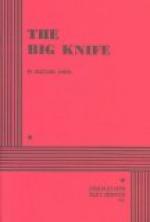|
This section contains 628 words (approx. 3 pages at 300 words per page) |

|
Logic might insist that there are three kinds of plays—good, bad, indifferent—but Clifford Odets' "The Big Knife" is none of these. It represents the state of Odets' soul in 1949; it is exasperating and exciting.
As a mechanism for conveying a definite theme, idea or emotion, "The Big Knife" is misbegotten….
The ostensible point of [the play] is that a good person in our society becomes the prisoner of forces that will manipulate him as a commodity. Unless he is a saint or a revolutionary he can live only by dying. Apart from any judgment as to the validity of this thesis, the play fails to demonstrate it.
The victim here is a good person because his wife says so, and because he speaks Odets' dialogue. The process of Charlie's deterioration is not dramatized. We never see him in a normal state. He has almost no history...
|
This section contains 628 words (approx. 3 pages at 300 words per page) |

|


